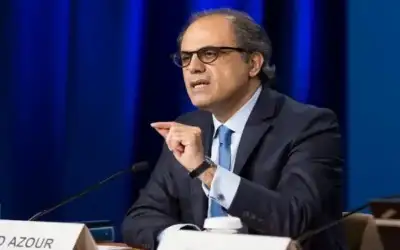The dysfunctional ethno-sectarian power-sharing model in Iraq
نيسان ـ نشر في 2015-08-13 الساعة 13:48
Michael Jansen
raqi Prime Minister Haidar Al Abadi responded to mass protests against the breakdown of essential services, corruption and misrule by pledging to eliminate senior government posts distributed in accordance with the dysfunctional ethno-sectarian power-sharing model imposed on Iraq by the US following the 2003 occupation. He has also called for civil service and other governmental appointments to be on the basis of merit rather than according to communal quotas and renewal of investigations into corruption.
Specifically, Abadi has proposed eliminating three vice presidents and three deputy prime ministers as well as their entourages of aides and bodyguards. While this move is portrayed as a cost-cutting measure at a time the Iraqi government is strapped for cash, its obvious purpose to end the sectarian system which has cost Iraq dearly in blood and treasure and led to the occupation of Mosul, Ramadi and Fallujah by Daesh.
While Abadi’s Cabinet and the Iraqi parliament have approved his proposals, implementation will be difficult if not impossible.
The politicians set to lose their positions have been in power since the occupation and have powerful constituencies and backers. The vice presidents due to be sacked are former prime minister Nouri Al Maliki, Ayad Allawi and Osama Al Najafi. Those to be dismissed from deputy prime ministerial posts are Saleh Al Mutlaq, Rowsch Shaways and Baha Araji, who has resigned and is expected to face corruption probes.
Maliki is head of the ruling Shiite fundamentalist Dawa Party, Alawi of the secular camp, and Najafi a leading Sunni who belongs to Mutlaq’s Front for National Dialogue, Shaways is a Kurd connected with the Kurdish Democratic Party of Masoud Barzani, and Araji from the powerful faction led by radical Shiite cleric Muqtada Al Sadr. It appears Sadr has agreed to Araji’s resignation.
If Abadi is to succeed he will also have to dismiss politicians appointed to the country’s “sovereign ministries” — interior, finance, foreign, defence and oil which have also been distributed among key parties including the powerful Iran-founded Badr Organisation, the Kurdish Democratic Party, Dawa, the Iraqi Forces Alliance and the Islamic Supreme Council of Iraq. Finally, he will have to deal with the Shiite sectarian militias which are now a law unto themselves and are the government’s mainstay in the war against Daesh because of the failure of the corrupted army to stand and fight.
These communal politicians, parties and militias have expressed support for Abadi’s initiative but are unlikely to surrender in spite of the blessing he has received for this “reform” programme from highly respected Shiite Grand Ayatollah Ali Al Sistani and tens of thousands of Iraqis who have joined protests partially driven by temperatures of 50ºC in the Shiite-majority southern cities and the capital, Baghdad.
Unfortunately, Abadi, who replaced Maliki, is a weak prime minister with no real political or personal constituency. Indeed, Maliki, who seeks to return to the top office, has been doing his best to undermine Abadi since he took office last August. Although Maliki, who has command of certain armed groups and militias, has said he supports the elimination of the deputy posts, he is unlikely to change his behaviour.
The US, Iraq’s overlord, the Iraqi politicians Washington had empowered, and Iran, the patron of the dominant Shiite fundamentalists, had the opportunity to usher in a viable post-2003 system of governance in the months following the 2010 election. The party that won the largest number of seats was secular Iraqiya, headed by Allawi. He should have been first to be asked to form a government but was not because the Shiite fundamentalists were determined that he should not become prime minister. It took months for Maliki, no one’s choice, to eventually cobble together a Cabinet, a Cabinet in which he held the key defence and interior ministries as well as the top job.
Maliki only managed to form a government in 2010 because he won the reluctant backing of Iran, which has been, at least in the short term, the main political beneficiary of Washington’s installation of an ethno-sectarian system of governance in Iraq. While Shiite domination of Iraq has given Iran considerable influence in that country and the region, this could very well backfire because Iraqis, Sunnis and Shiites alike, are Arabs not Iranians and many already resent Tehran’s interference in Baghdad’s affairs.
Fear of losing (or determination to hang onto) his job, prompted Maliki to consolidate his personal grip on power during his second term. Once this was achieved, he apparently believed he was irreplaceable and could act as he pleased. When confronted with demonstrations against mismanagement and corruption in 2011 and with protests over discrimination against Sunnis in 2012, Maliki used brute force to put down the protesters. His response led directly to the revival of Al Qaeda in Iraq and the birth of Daesh.
While Allawi would have been bound by the nonviable sectarian system written into the constitution, he is a secular nationalist whose voters in the 2010 election were heavily Sunni. Therefore, he would not have used brute force to crush Sunni protests against marginalisation that erupted in 2012 and he might have been able to counter and curb the cronyism, nepotism and flagrant corruption that has collapsed state structures and the armed forces, leaving Iraqis without electricity, water and public services, and prey to Daesh.
It is too late for Allawi now. His bloc has splintered and, although he was guaranteed an influential position during 2010 negotiations over a government, he was always relegated to the background. The idea of a party that would embrace all Iraqis without discrimination — Shiites, Sunnis, secularists, Christians, Kurds and others — is seen as a threat by the ethno-sectarian communal parties. After all, the Baathists, Arab nationalists and even the communists — the secular parties involved in ruling Iraq before 2003 — excluded the ethno-sectarian communalists from power — with good reason.



